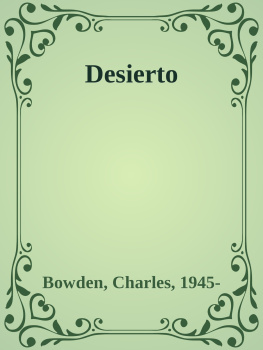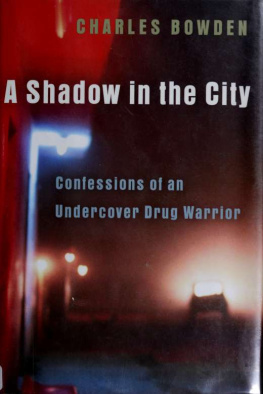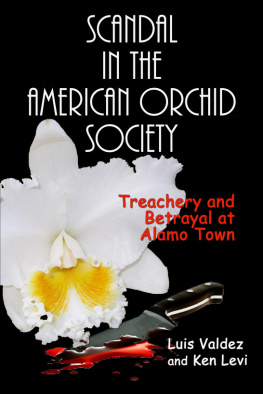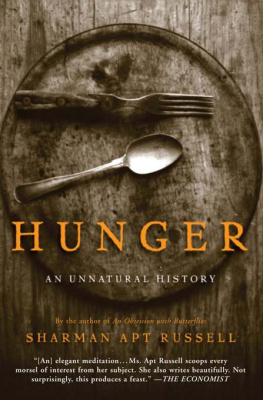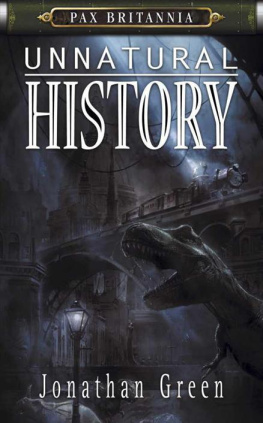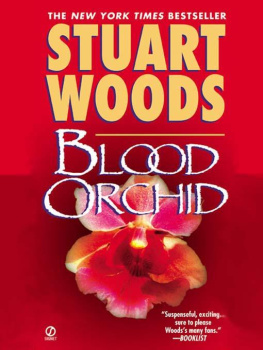Also by Charles Bowden
Killing the Hidden Waters (1977)
Street Signs Chicago: Neighborhood and Other Illusions of Big-City Life, with Lewis Kreinberg and Richard Younker (1981)
Blue Desert (1986)
Frog Mountain Blues, with Jack W. Dykinga (1987)
Trust Me: Charles Keating and the Missing Billions, with Michael Binstein (1988)
Mezcal (1988)
Red Line (1989)
Desierto: Memories of the Future (1991)
The Sonoran Desert, with Jack W. Dykinga (1992)
The Secret Forest, with Jack W. Dykinga and Paul S. Martin (1993)
Seasons of the Coyote: The Legend and Lore of an American Icon, with Philip L. Harrison (1994)
Chihuahua: Pictures From the Edge, with Virgil Hancock (1996)
Stone Canyons of the Colorado Plateau, with Jack W. Dykinga (1996)
Jurez: The Laboratory of Our Future, with Noam Chomsky and Eduardo Galeano (1998)
Eugene Richards, with Eugene Richards (2001)
Down by the River: Drugs, Money, Murder, and Family (2002)
Blues for Cannibals: The Notes from Underground (2002)
A Shadow in the City: Confessions of an Undercover Drug Warrior (2005)
Inferno, with Michael P. Berman (2006)
Exodus/xodo, with Julin Cardona (2008)
Some of the Dead Are Still Breathing: Living in the Future (2009)
Trinity, with Michael P. Berman (2009)
Murder City: Ciudad Jurez and the Global Economys New Killing Fields (2010)
Dreamland: The Way Out of Jurez, with Alice Leora Briggs (2010)
The Charles Bowden Reader (2010)
El Sicario: The Autobiography of a Mexican Assassin, with Molly Molloy (2011)
The Red Caddy: Into the Unknown with Edward Abbey (2018)
BLOOD ORCHID
AN UNNATURAL HISTORY OF AMERICA
Charles Bowden
FOREWORD BY WILLIAM LANGEWIESCHE

University of Texas Press
Austin

Copyright 1995 by Charles Bowden
The Charles Clyde Bowden Literary Trust
Mary Martha Miles, Trustee
Foreword copyright 2018 by William Langewiesche
All rights reserved
The first edition of Blood Orchid was published in 1995 by Random House.
Grateful acknowledgment is made to the following for permission to reprint previously published material: Excerpts from Nunca Ms: The Report of the Argentine National Commission on the Disappeared. Translation copyright 1986 by Writers and Scholars International Ltd. Reprinted by permission of Farrar, Straus and Giroux.
Excerpt from Joy To The World, words and music by Hoyt Axton: Copyright 1970 IRVING MUSIC, INC. Copyright renewed. All Rights Reserved. Used by Permission. Reprinted by Permission of Hal Leonard LLC.
Requests for permission to reproduce material from this work should be sent to:
Permissions
University of Texas Press
P.O. Box 7819
Austin, TX 78713-7819
utpress.utexas.edu/rp-form
Library of Congress Cataloging-in-Publication Data
Names: Bowden, Charles, 19452014, author.
Title: Blood orchid : an unnatural history of America / Charles Bowden.
Description: Austin : University of Texas Press, 2018. | The first edition of Blood Orchid was published in 1995 by Random House.
Identifiers: LCCN 2017050180
ISBN 978-1-4773-1684-9 (pbk. : alk. paper)
ISBN 978-1-4773-1685-6 (library e-book)
ISBN 978-1-4773-1686-3 (non-library e-book)
Subjects: LCSH: West (U.S.)Description and travel. | Natural historyWest (U.S.)
Classification: LCC F595.3 .B69 2018 | DDC 917.804dc23
LC record available at https://lccn.loc.gov/2017050180
doi:10.7560/316849
It was the time of the preacher
In the year of 01
And just when you think its all over
Its only begun.
WILLIE NELSON
For the QUICK. And the DEAD.
And all the lovers of this good and lusty earth.
And the whore with the blue teeth and the
lucky coins, a woman who didnt let the
orchids get her down.
Mine heritage is unto me as a speckled bird, the birds round about are against her; come ye, assemble all the beasts of the field, come to devour.
JEREMIAH, 12:9
Gold is a wonderful thing! Whoever owns it is lord of all he wants. With gold it is even possible to open for souls the way to paradise!
CHRISTOPHER COLUMBUS, 1503
At what point shall we expect the approach of danger? By what means shall we fortify against it? Shall we expect some transatlantic military giant, to step the Ocean, and crush us at a blow? Never! All the armies of Europe, Asia and Africa combined, with all the treasury of the earth... could not by force, take a drink from the Ohio, or make a track on the Blue Ridge, in a trial of a thousand years.... If destruction be our lot, we must ourselves be its author and finisher. As a nation of freemen, we must live through all time, or die by suicide.
ABRAHAM LINCOLN, 1838
In living one swims through seas strewn with wrecks, where none go undamaged. It is as bad as going to Congress: none comes back innocent.
RALPH WALDO EMERSON
Gold was discovered there, a railroad is built, and the beautiful forests are being swept away, and the virgin lakes & streams robbed of their trout and I am forced to choose this great city, for the final act of my drama and life. I feel like apologizing but on the whole it is the best I can do.
GENERAL WILLIAM TECUMSEH SHERMAN, 1888, explaining why he retired to New York City instead of Coeur dAlene, Idaho
And I say it for myself: the moment I get on one of those sidewalks, I start to fall down.
EMILIANO ZAPATA, December 4, 1912
I shall try to make plain the bloodiness of killing.
Too often this has been slurred over....
JOHN BAKER, 1967
Phoenix is Thunderbird, Billings muscatel, L.A. white port and tokay (all the way with tokay), Seattle Apple Andy, around the reservations muscatel (mustnt tell).
ROBERT SUNDANCE, 1992, on the favorite booze of skid rows in various western towns
Content
Foreword
WILLIAM LANGEWIESCHE
Charles Bowden was a tall, imposing man and a Westerner to his core. He started as a gumshoe reporter for the Tucson Citizen, a daily newspaper in Tucson, Arizona. This was in the early 1970s, when the counterculture was still alive, and Edward Abbey was in town, about to publish The Monkey Wrench Gang. Bowden was in his midtwenties at the time. He had dropped out of a PhD program in Illinois, had traveled for a while, and had dabbled in various political protestsantiVietnam War, antiJim Crow lawsbefore landing the job. He was assigned to the city desk, and though he gravitated to Abbeys anarchistic circle, he wrote about mundane matters in ordinary ways, at least for a while. He was married to his second wife at the time and trying to sustain a modest middle-class life, so he could not afford to write otherwise. Years later, in 1998, long after Bowden had liberated himself from such constraints, Lewis Lapham, the editor of Harpers, published Bowdens memoir of that pivotal period in his story. The essay was entitled Torch Song: At the Peripheries of Violence and Desire. In it Bowden wrote,
Next page




